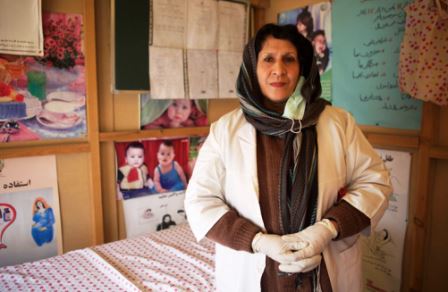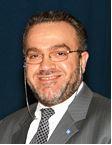Dr Basel Al Yousfi, Director of the Regional Centre for Environmental Health Action
Dr Basel Al Yousfi
Director of the Regional Centre for Environmental Health Action (CEHA)
Vision
CEHA is an environmental health centre of excellence in supporting countries of the Region in their efforts to reduce the toll of morbidity and premature mortality caused by modifiable environmental risk factors.
Mission
CEHA provides technical guidance, programmatic support, advisory consultations and related services to Member States and partner agencies to heighten the leadership role of the public health sector in regulating, surveilling and managing environmental risks. Support is provided in the areas of water and sanitation, waste management, air quality, food and chemical safety, vector control, and environmental health emergency management. CEHA coordinates WHO support in the cross-cutting issues of climate change, sustainable development, knowledge management, and environmental health risk communication.
Biography
Dr Al-Yousfi has been the Director of the WHO Regional Centre for Environmental Health Action since August 2009. Formerly, he had served from January 2001 in the United Nations Environment Programme as a Deputy Regional Director in West Asia.
Dr Al-Yousfi holds Ph.D. and M.S. degrees in Environmental Engineering from the USA, and a B.Sc. in Civil Engineering from Syria. He is Board Certified by the American Academy of Environmental Engineers and Scientists.
In the 10 years prior to working for the United Nations, Dr Al-Yousfi worked in the international petrochemical industry; and held an academic post at the University of Central Florida in the United States of America. He also served as an adjunct professor at Marshall University in the USA and the Arabian Gulf University in Bahrain. He was the Associate Editor of 2 major scientific journals, has over 60 peer-reviewed publications, and has received several international awards.
New delivery rooms in camps save mothers and give life
20 January 2016 – Every mother should expect childbirth to be full of positive and joyful memories. But current crises have hampered most pregnant women’s access to delivery rooms in Al-Habanyia tourist city and Al-Khaldia district in Ramadi City. To increase access to services and to provide every mother with the opportunity for a healthy start with her newborn child, Al-Anbar Department of Health, WHO and the United Nations Population Fund have established 2 delivery rooms in these 2 districts. These facilities will provide reproductive health care services to women of childbearing age and will ensure that 5150 internally displaced families n Al-Habanyia tourist city and 12 000 families in Al-Khaldia district have access to such services.
The project’s operational plan includes various stages, the most important part of which was securing all medical supplies for the new delivery rooms, with staff available on a 24/7 basis. Ambulances are available around the clock to refer emergency cases to hospitals and to transfer pregnant women from nearby internally displaced persons (IDP) camps to the delivery rooms.
“We are planning to deploy 5 new caravans in the 2 locations as additional delivery rooms. Because no gynaecologist is currently available in Al-Habanyia tourist city and due to high demand created by the high number of internally displaced families, an additional caravan was deployed to Al-Habanyia delivery room and a gynaecologist was hired to provide the required gynaecological and antenatal consultations to women there.
The establishment of the 2 delivery rooms has had a huge impact and brought a real positive change to reproductive health services in these 2 districts said Altaf Musani, Acting WHO Representative.
The number of consultations (both antenatal and gynaecological) provided from 1 October 2015 until 11 January 2016 were Al-Khaldia (1954) and Al-Habanyia (4765).
The number of deliveries were Al-Khaldia (313) and in Al-Habanyia (74). All births went well with no complications and healthy outcomes for the mother and child.
Iraq completes round one of oral cholera vaccination campaign
Baghdad, 12 November 2015 – This week, the Government of Iraq, with the support of WHO and UNICEF, completed the first round of the oral cholera vaccination campaign. The campaign has vaccinated 91% of the targeted population of Syrian refugees and internally displaced Iraqis in camps around the country. The turnout was very high with no refusals or concerns raised regarding the vaccine. A second round will begin in December to administer a second dose to ensure protection against cholera for five years or more.
Oral cholera vaccination campaign
The OCV campaign was discussed and agreed by stakeholders in September 2015. This was followed by planning and training sessions for governorate-level managers of the expanded programme on immunization in Baghdad on 26 and 27 October. On 28 October, training was provided to 1302 vaccinators and 651 social mobilizers in preparation for the first round of the mass vaccination campaign.
The ShancholTM vaccine used in the campaign is a WHO prequalified vaccine. To achieve the required protection among high risk groups, two doses of OCV ShancholTM vaccine will be administered with an interval of two to six weeks.
The first round of the campaign, lasting an initial five days, began on October 31 and the second round is due to take place in early December 2015. The administration of a second dose is needed to extend the duration of protection for five years or more. The vaccine is being administered to all persons over one year of age living in the target camps.
Cholera vaccination is an additional preventive measure that supplements but does not replace other traditional cholera control measures. “We need to intensify health promotion and education activities to help communities protect themselves and their families from cholera and other communicable diseases,” said acting WHO Representative Altaf Musani.
Intensive social mobilization and advocacy campaigns are therefore being undertaken, including the nationwide dissemination of one million water, sanitation and hygiene messages. Messages are being disseminated through electronic media, social media, mobile phones and mobile vans.
The campaign started on 31 October 31 in seven of the 13 governorates, followed by four more on 2 November (Dohuk, Sulaymaniyah, Erbil and Diyala), one on 3 November (Kirkuk) and one on 4 November (Anbar). Heavy rains, flooding and insecurity have delayed the completion of the vaccination campaign in most governorates in the central and southern parts of Iraq.
The Ministry of Health is leading the emergency response to curb the outbreak with technical support from the Cholera Task Force. In addition to advocacy efforts, the response focuses on supporting water, sanitation, and hygiene activities through monitoring of water quality and ensuring access to safe water inside health facilities and waste management at cholera treatment centres.
Staff from WHO, UNICEF and health cluster partners have been deployed to carry out the monitoring, evaluation and documentation of best practices in the introduction of the OCV in Iraq. They have also facilitated campaign logistics and preparation in selected locations to ensure that as many people as possible are protected.
For more information, please contact:
Ms. Rana Sidani
Senior Communication
Officer
WHO Regional Office,
Cairo
Direct: +20 2 22765552
Mobile: +20 1099756506
E-mail:
Ms. Rosane Lopes
Communications Officer
World Health Organization,
Iraq Country Office
E-mail:
Mobile: +964 7809 288 614
Saving lives with mobile health services in Afghanistan

For 30 years, Dr Aziza has been providing health services to those most in need.
August 2015 - For the past 4 years, Dr Aziza has been working as a midwife at a mobile clinic in Nasaji-Bagrami camp for internally displaced persons (IDPs) in Kabul. Operated by an Afghan nongovernmental organization Serve Health Relief and Development Organization (SHRDO), the clinic provides basic health services to 450 families living in the camp.
“I have seen a lot of positive change since I started working in this camp,” Dr Aziza says. “Before, people were not taking care of their personal hygiene and knew nothing about family planning or birth control. Now more and more women come to the clinic to seek these services.”
Despite progress in the last decade, maternal mortality rate remains high in Afghanistan with an average of 400 maternal deaths per 100 000 live births. Most of these deaths could be avoided by increasing women’s access to health services with skilled birth attendants.
Dr Aziza arrives at the camp at 8:30 am every morning and sees around 40 patients a day. She provides health education and also basic counselling services to women suffering from mental health issues. Many of her patients are pregnant women or women suffering from postnatal problems and high blood pressure.
Although the Nasaji-Bagrami IDP camp clinic does not have the facilities to provide childbirth services, Dr Aziza does what she can to help mothers and babies. She recommends women to go to hospitals and clinics for delivery and informs them about the risks associated with home births.
“One day when I came to the camp I saw one of my regular patients who had just given birth, telling me that the baby’s heart is not beating. I rushed to the mother and gave her baby mouth-to-mouth resuscitation and saved his life. I have also helped other women with their newborn babies,” Dr Aziza says.
Supported by the World Health Organization with USAID funding, the mobile clinic also provides life-saving vaccines to children. The mobile health team has been successful in changing the community’s perception about vaccination through outreach and health education. After receiving information about the benefits of vaccines, now almost all families come to the clinic regularly to immunize their children.
“I prefer to work in this clinic even if I have the chance to work in private hospitals,” Dr Aziza says. “Women are so deprived in our society. Through this work I can help them a lot which makes me very happy.”



